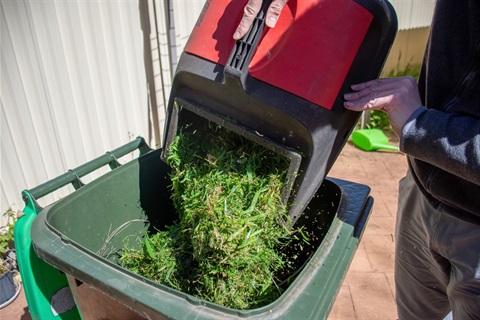Borough seeks community input on sustainable waste facility
Published on 08 October 2021

The Borough of Queenscliffe is partnering with Barwon Water and five other regional councils to develop an innovative new waste solution that turns food and garden waste into useable products. As the project gets underway, the partnership group is inviting the community to share their views.
The Regional Renewable Organics Network Facility project, developed in response to rising waste costs, capacity constraints, and a desire to make our region more sustainable, is expected to process 40,000 tonnes of organic waste each year. Using a combination of bacterial digestion and heat treatment, this processing would turn the waste into renewable energy and high-quality fertiliser products which can then be sold to support local agriculture. The state-of-the-art facility is proposed for a small section of Barwon Water’s Black Rock Water Reclamation Plant in Connewarre.
Barwon Water managing director Tracey Slatter said the Regional Renewable Organics Network would deliver significant environmental, economic and community benefits for the region. “The network would divert waste from landfill, reduce our impact on the environment, help keep waste costs under control and create local jobs,” Ms Slatter said “The Regional RON will lead the way in our region’s transition to a circular economy, where materials are continually reused and recycled to increase their lifespan, add value and reduce waste,” she said. “We are delighted to be partnering with local government for this unique and exciting project.”
Queenscliffe Mayor Ross Ebbels said the project’s environmental benefits were important to the Council, which is rolling out its Climate Emergency Response Plan in a bid to make the community carbon-neutral by 2031. “This facility is expected to reduce total carbon emissions from our region’s waste processes by up to 15,000 tonnes every a year, while generating enough electricity to power 500 homes,” Cr Ebbels said. “Being able to not only reduce the environmental impact of our organic waste but to turn it into a useful product is exactly the kind of innovative thinking we need in the fight against climate change.”
While the benefits of the project are clear, the Borough of Queenscliffe and Barwon Water are seeking community input to further develop the concept and ensure residents play a role in shaping the project. Consultation is now open for the project, and residents can learn more and share their ideas at Barwon Water's RRON project page, with feedback closing on 26 November 2021. Barwon Water will also be holding a series of community webinars and information sessions with opportunities to ask questions, address areas of interest and have input into the early stages of the project’s design.
Cr Ebbels said that hearing from the community was essential to the project’s success. “We know a lot of our residents have great ideas about making our region more sustainable, and we want to hear what you think,” Cr Ebbels said. “Sharing your ideas for the Regional Renewable Organics Network will help us make the facility a win for everyone.”
While the project is innovative in both scale and scope, the Regional Renewable Organics Network would be built using proven technology. Barwon Water has successfully demonstrated the concept on a smaller scale at its Colac Water Reclamation Plant, which takes organic waste from local industry and converts it into enough renewable energy to take the plant entirely off the grid. More information about the project and its benefits is available on Barwon Water’s website.